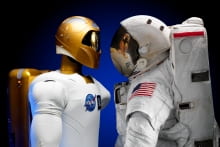By: Keaton Fletcher
In a recent article, CNN highlighted seven ways in which technological advances are potentially changing the way we work. For example, humans are generally pretty terrible at cybersecurity. Many companies have started to use biometric authentication (e.g., iris scanning, fingerprint scanning, or facial recognition) to provide workers access to computer terminals. Hospitals have also started using this technology to protect medications and patient files. Some companies, such as Three Square Market, have started optional programs that allow employees to have a microchip embedded under their skin that acts as their ID badge.
Beyond simple technological innovations for cybersecurity, many companies are turning toward artificial intelligence (AI) to help workers perform better. In healthcare, for example, AI programs have been shown to complete a task that normally takes radiologists 45 minutes (determining blood flow and the volume of cardiac muscles) in a matter of seconds. But AI is not just limited to simple data processing. AI-CDß an AI robot used by McCann Worldgroup Japan, is used as a creative director for television ads.
AI has also made its way into the world of pop music, changing the careers of songwriters in addition to the soundscape on the radio. In a recent podcast episode, musicologist Nate Sloan of Fordham University, and songwriter Charlie Harding, interview songwriter Taryn Southern about her use of AI in songwriting. Together they discussed the multitude of AI programs available as tools to assist songwriters (e.g., Aiva, Flow Machines, Amper, and Nsynth) including the benefits and drawbacks. In a musical Turing Test, Nate and Taryn listened to six pairs of song clips: one written entirely by a human and the other written with the help of AI. The differences were hard to hear, with AI-based music often slightly more complex than human-only music. Both Taryn and Nate found themselves stumped more than once. The hosts acknowledged that in its current form, AI music is either a good tool in a songwriter’s belt or is a replacement for songwriters who are only writing stock music.
Another major area of technological advance is robotics. In a podcast episode, Pamela Gay, Director of Technology and Citizen Science for the Astronomical Society of the Pacific, and Fraser Cain, founder of The Universe Today and director of Cosmoquest, discussed the use of robots on the International Space Station. Specifically, they pointed out two semi-autonomous robots: Dextre and Robotonaut 2 (R2). Dextre is a large set of robotic arms that can either be controlled directly by astronauts or can run autonomously on pre-programmed tasks. It helps complete dangerous but relatively time-consuming and mundane repair activities on the outside of the space station. R2 is a humanoid robot that is being tested inside the ISS in its ability to take over routine, mundane tasks that require human-level dexterity.
Certainly, technological advances are making leaps and bounds. As we navigate the coming changes in the workplace, it will be critical to understand how humans interact with technology, and how technology changes the experience of work itself.

